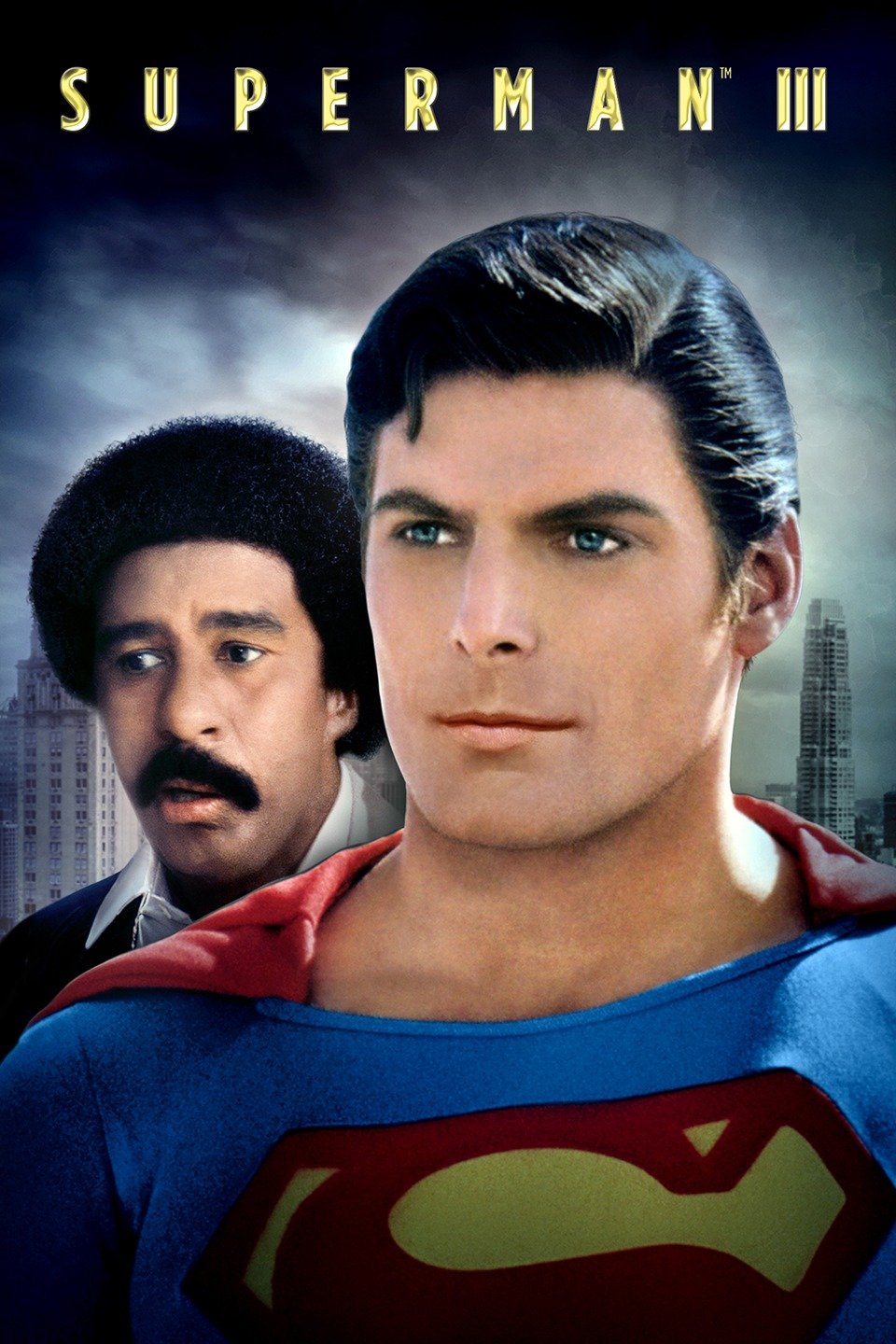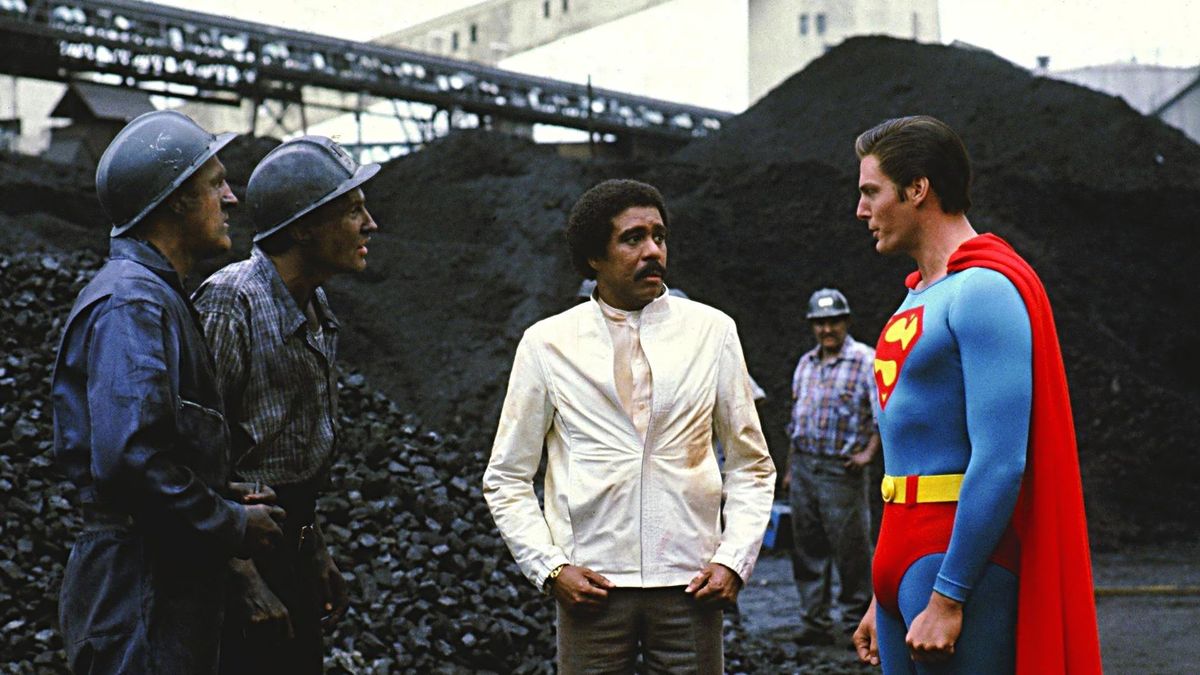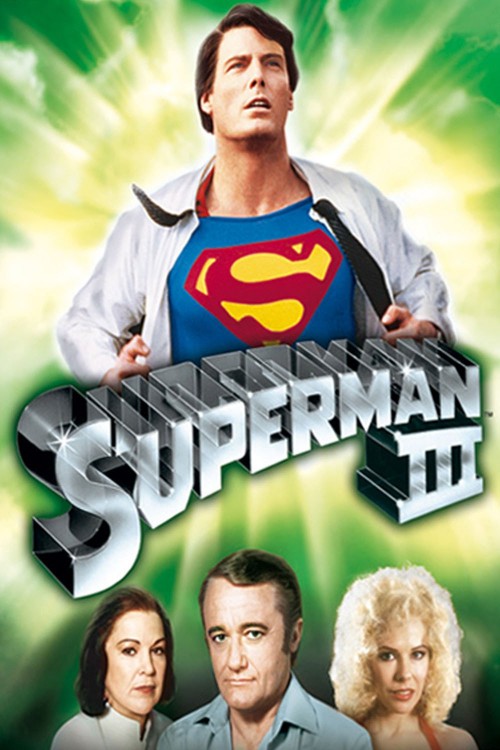Superman III Cast: Meet The Iconic Actors & Characters!
Can a film truly capture the essence of a hero, or is it destined to fall short of the soaring expectations set by its predecessors? The 1983 film, "Superman III," directed by Richard Lester, attempted to do just that, but the results were, to put it mildly, divisive. This installment in the Superman film series, following the critically acclaimed "Superman" (1978) and "Superman II" (1980), faced the daunting task of maintaining the momentum of its predecessors while introducing new elements and characters. As we delve into the world of "Superman III," we must examine the performances, the plot, and the overall impact of this superhero adventure, which, despite its flaws, holds a unique place in the history of cinematic Superman.
The film, based on the DC Comics character, saw the return of Christopher Reeve as the Man of Steel, bringing back the familiar charm and charisma that defined the role. Richard Pryor, the celebrated comedian, joined the cast, injecting a dose of humor that was a departure from the tone of the earlier films. Annette O'Toole, known later for her role in "Smallville," took on the part of Lana Lang, adding another layer to the narrative. The film aimed to deliver a blend of action, comedy, and drama, but how did it fare in the execution?
The narrative thrusts Superman into a series of challenges, ranging from corporate villainy to the creation of synthetic kryptonite. The plot, conceived by David Newman and Leslie Newman, saw Superman confront the machinations of a wealthy executive, Ross Webster, played by Robert Vaughn, who enlists a computer genius, Gus Gorman, portrayed by Richard Pryor, to execute his schemes. In this endeavor, the film brought forth both action and also delved into Superman's personal life, particularly his relationship with Lana Lang. The movie also ventured into the realm of computer technology, which, in 1983, was at a somewhat nascent stage.
The film's impact on the audience was varied. William Thomas of Empire Magazine wrote that "the action is good, but this doesn't move the audience in the same way as the first two." Linda Deutsch of the Associated Press, in her review of August 13, 2020, stated that "\u201cSuperman III\u201d drops most of the threads of the first two movies \u2014 including Lois Lane\u2019s increasingly complex love affair with Clark Kent and Superman \u2014 and goes for the action. There\u2019s no real sense of what superman, or clark, ever really feels."
The movie did, however, showcase the talents of the cast. Reeve, as always, was dedicated to his role and brought forth his usual charm. Pryor's inclusion brought a unique comedic element. O'Toole's portrayal of Lana Lang offered a different romantic perspective. The visual effects, though dated by today's standards, were ambitious for the time, attempting to create a world of superheroics and technological innovation. The film also had its moments of humor, often stemming from Pryor's character, but the tone often felt disjointed.
Now, let's delve into the main players in the movie and what they have done, to analyze the movie better.
Key Cast and Crew of Superman III
Here's a comprehensive look at the main cast and crew of "Superman III," along with some insights into their careers and contributions to the film:
| Actor/Crew Member | Role | Brief Biography | Notable Works (Besides Superman III) | Reference Link |
|---|---|---|---|---|
| Christopher Reeve | Superman/Clark Kent | Born September 25, 1952, in New York City, New York, USA; Died October 10, 2004. Became one of the most iconic actors to play Superman, known for his ability to embody both the heroic and human sides of the character. His acting career started with a stage appearance, and he made his screen debut in the TV series "Love of Life" (1974). | "Superman" (1978), "Superman II" (1980), "Somewhere in Time" (1980), "The Bostonians" (1984), "Street Smart" (1987), "The Remains of the Day" (1993). | IMDB |
| Richard Pryor | Gus Gorman | Born December 1, 1940, in Peoria, Illinois, USA; Died December 10, 2005. A groundbreaking comedian and actor, known for his stand-up comedy and his ability to discuss race and social issues through humor. His comedy was hugely influential, and he starred in numerous films throughout the 1970s and 1980s. | "Silver Streak" (1976), "Brewster's Millions" (1985), "See No Evil, Hear No Evil" (1989), "Harlem Nights" (1989), "The Toy" (1982) | IMDB |
| Annette O'Toole | Lana Lang | Born April 1, 1952, in Houston, Texas, USA. An actress known for her work in both film and television. She has a long and varied career, including roles in various genres, from dramas to comedies, with a special affection for the Superman mythos. | "48 Hrs." (1982), "Cat People" (1982), "Smallville" (TV Series) as Martha Kent, "It" (1990) | IMDB |
| Robert Vaughn | Ross Webster | Born November 22, 1932, in New York City, New York, USA; Died November 11, 2016. A prolific actor with a career spanning decades, known for his roles in film and television, including his portrayal of the cool and calculating villain. | "The Magnificent Seven" (1960), "The Man from U.N.C.L.E." (TV Series), "Bullitt" (1968), "Towering Inferno" (1974). | IMDB |
| Richard Lester | Director | Born January 19, 1932, in Philadelphia, Pennsylvania, USA. A British-American film director known for his innovative and often unconventional approach to filmmaking, particularly his work on comedies and action films. | "A Hard Day's Night" (1964), "Help!" (1965), "The Three Musketeers" (1973), "Superman II" (1980). | IMDB |
| David Newman and Leslie Newman | Screenwriters | David Newman, born February 4, 1937, in New York City, New York, USA; Died February 10, 2003, and Leslie Newman. The screenwriting team of David and Leslie Newman collaborated on several successful films. | "Superman" (1978), "Superman II" (1980), "Santa Claus: The Movie" (1985), "Bonfire of the Vanities" (1990). | IMDB |
| Jackie Cooper | Perry White | Born September 15, 1922, in Los Angeles, California, USA; Died May 3, 2011. Child actor and later a director and producer, known for his roles in various films. | "The Champ" (1931), "Skippy" (1931), "The Bowery Boys" (1946), "Superman: The Movie" (1978) and "Superman II" (1980). | IMDB |
| Marc McClure | Jimmy Olsen | Born March 31, 1957, in Burbank, California, USA. An actor known for playing Jimmy Olsen in the Superman films. | "I Wanna Hold Your Hand" (1978), "Back to the Future" (1985), "Superman: The Movie" (1978) and "Superman II" (1980). | IMDB |
The inclusion of Richard Pryor was a strategic move, aimed at adding humor, which would broaden the film's appeal. The comedic elements, however, did not always mesh seamlessly with the superhero action, leading to a tonal imbalance. This was one of the critical problems with the movie as the film had many odd moments of physical comedy spread throughout the movie.
The visual effects, while commendable for their time, haven't aged as gracefully as those in the first two films. Special effects technology has advanced significantly since 1983, and the visual spectacle of the film, while once impressive, now seems somewhat dated. However, it's worth noting that the film's creators were working with the technology available to them, and their efforts were, in some ways, pioneering.
The core themes of "Superman III" explore themes of duality, corruption, and redemption. Superman, as always, represents the forces of good, while his adversaries symbolize the darker aspects of humanity. The film also ventures into the realm of computer technology, foreshadowing the increasing role of technology in society. The plot centers around the development of synthetic kryptonite, which yields some unexpected psychological effects on Superman, making him confront his darker side.
The film has its own distinct legacy, and the film, despite its flaws, is still a significant part of the Superman film series. The movie's box office success showcased the lasting appeal of the Man of Steel. Despite mixed reviews, "Superman III" remains a part of the cultural landscape. The film's place in cinematic history is secure, as it continues to be discussed, analyzed, and debated by fans and critics.
When compared to "Superman" and "Superman II," "Superman III" falls short in several areas. The first two films benefited from a more cohesive narrative, a stronger sense of emotional depth, and a more consistent tone. They are characterized by their grounded storytelling, character development, and exploration of themes such as heroism, sacrifice, and the burden of power. They feature memorable performances from Christopher Reeve and Margot Kidder, and a sense of wonder and awe that captivated audiences. "Superman III," on the other hand, leans more heavily on comedy, which, while entertaining, does not align with the tone of the earlier movies. The film's narrative, with its focus on computer technology and corporate villainy, feels less compelling than the conflicts in "Superman" and "Superman II." The complex relationship between Lois Lane and Clark Kent, a key element in the earlier films, is diminished. "Superman III" focused on Superman's relationship with Lana Lang.
There is a certain charm to the film, however, and the presence of Richard Pryor is very important. His character brought forth a fresh comedic element and his performance is a highlight of the film. Annette O'Toole's portrayal of Lana Lang brings warmth and humanity to the narrative, creating a different type of connection with Superman. The films visual effects, though now dated, were ambitious for their time, pushing the boundaries of what could be achieved. The film's exploration of the psychological effects of kryptonite on Superman is an interesting thematic element.
The film's impact on the Superman franchise is also worth exploring. While "Superman III" did not garner the same critical acclaim as its predecessors, it still played a role in the evolution of the franchise. The film's financial success demonstrated the enduring appeal of the Man of Steel. The film also brought in new audiences with its comedic elements and innovative special effects. It also paved the way for subsequent Superman films, which continued to explore various interpretations of the character.
The role of Richard Lester as the director also warrants examination. Lester's directing style, which has a unique approach to filmmaking, is characterized by his innovative use of humor and action. His approach was to create a more lighthearted and entertaining cinematic experience. This approach contrasted with the more serious tone of the earlier Superman movies, but it brought a fresh perspective to the franchise. This is one of the key reasons why the movie has become famous. The movie has become so famous because of it's lighthearted approach.
The film, in 1983, also explored the rising concerns about computer technology. The film's narrative integrated themes of technological advancement, which reflected the societal attitudes of the time. The film also offered a commentary on corporate greed and the misuse of technology for selfish purposes. The film's inclusion of such issues indicates its awareness of the social and political environment of the era.
One must also evaluate the film's significance for the cast. Christopher Reeve's dedication to the role of Superman continued to define the character for audiences, even in this installment. Richard Pryor's involvement brought increased attention to the film. The movie added to Annette O'Toole's career. The ensemble cast, which included familiar faces like Jackie Cooper as Perry White and Marc McClure as Jimmy Olsen, brought a sense of continuity to the series.
The lasting legacy of "Superman III" is that it remains a subject of debate among fans and critics. Some viewers consider it a significant film in the Superman canon, while others believe that it does not meet the standards of its predecessors. The film's success at the box office and its cultural impact show that it has made a mark on cinematic history. The film remains a testament to the ongoing fascination with the Man of Steel.
As we look at "Superman III" again, we can observe its impact. The film's blend of action, comedy, and drama, with its themes of duality, corruption, and redemption, created a unique installment in the Superman film series. The contributions of the cast and crew, the visual effects, and the incorporation of technological themes. "Superman III," while not perfect, has secured its place in the legacy of the Man of Steel. This film serves as a reminder that even a superhero can have moments of both triumph and, perhaps, a few missteps along the way.


